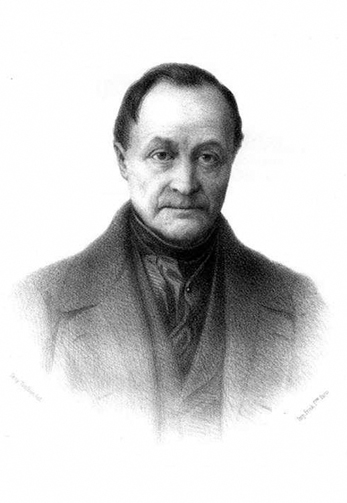Lesson One - An Introduction to Sociology
1.2 The History of Sociology
August Comte
The Father of Sociology
The term sociology was first coined in 1780 by the French essayist Emmanuel-Joseph Sieyès (1748–1836) in an unpublished manuscript (Fauré et al. 1999). In 1838, the term was reinvented by Auguste Comte (1798–1857). The contradictions of Comte’s life and the times he lived through can be in large part read into the concerns that led to his development of sociology. He was born in 1798, year 6 of the new French Republic, to staunch monarchist and Catholic parents, who lived comfortably off the father’s earnings as a minor bureaucrat in the tax office. Comte originally studied to be an engineer, but after rejecting his parents’ conservative views and declaring himself a republican and free spirit at the age of 13, he got kicked out of school at 18 for leading a school riot, which ended his chances of getting a formal education and a position as an academic or government official.
He became a secretary of the utopian socialist philosopher Claude Henri de Rouvroy Comte de Saint-Simon (1760–1825) until they had a falling out in 1824 (after St. Simon perhaps purloined some of Comte’s essays and signed his own name to them). Nevertheless, they both thought that society could be studied using the same scientific methods utilized in the natural sciences. Comte also believed in the potential of social scientists to work toward the betterment of society and coined the slogan “order and progress” to reconcile the opposing progressive and conservative factions that had divided the crisis-ridden, post-revolutionary French society. Comte proposed a renewed, organic spiritual order in which the authority of science would be the means to reconcile the people in each social strata with their place in the order. It is a testament to his influence that the phrase “order and progress” adorns the Brazilian coat of arms (Collins and Makowsky 1989).
Comte named the scientific study of social patterns positivism. He described his philosophy in a well-attended and popular series of lectures, which he published as The Course in Positive Philosophy (1830–1842) and A General View of Positivism (1848). He believed that using scientific methods to reveal the laws by which societies and individuals interact would usher in a new “positivist” age of history. His main sociological theory was the law of three stages, which held that all human societies and all forms of human knowledge evolve through three distinct stages from primitive to advanced: the theological, the metaphysical, and the positive.The key variable in defining these stages was the way a people understand the concept of causation or think about their place in the world.
In the theological stage, humans explain causes in terms of the will of anthropocentric gods (the gods cause things to happen). In the metaphysical stage, humans explain causes in terms of abstract, “speculative” ideas like nature, natural rights, or “self-evident” truths. This was the basis of his critique of the Enlightenment philosophers whose ideas about natural rights and freedoms had led to the French Revolution but also to the chaos of its aftermath. In his view, the “negative” or metaphysical knowledge of the philosophers was based on dogmatic ideas that could not be reconciled when they were in contraction. This lead to irreconcilable conflict and moral anarchy. Finally, in the positive stage, humans explain causes in terms of scientific procedures and laws (i.e., “positive” knowledge based on propositions limited to what can be empirically observed). Comte believed that this would be the final stage of human social evolution because science would reconcile the division between political factions of order and progress by eliminating the basis for moral and intellectual anarchy. The application of positive philosophy would lead to the unification of society and of the sciences (Comte 1830).
Although Comte’s positivism is a little odd by today’s standards, it inaugurated the development of the positivist tradition within sociology. In principle, positivism is the sociological perspective that attempts to approach the study of society in the same way that the natural sciences approach the natural world. In fact, Comte’s preferred term for this approach was “social physics”—the “sciences of observation” applied to social phenomena, which he saw as the culmination of the historical development of the sciences. More specifically, for Comte, positivism:
- “Regards all phenomena as subjected to invariable natural laws”
- Pursues “an accurate discovery of these laws, with a view of reducing them to the smallest possible number”
- Limits itself to analyzing the observable circumstances of phenomena and to connecting them by the “natural relations of succession and resemblance” instead of making metaphysical claims about their essential or divine nature (Comte 1830)
While Comte never in fact conducted any social research and took, as the object of analysis, the laws that governed what he called the general human “mind” of a society (difficult to observe empirically), his notion of sociology as a positivist science that might effectively socially engineer a better society was deeply influential. Where his influence waned was a result of the way in which he became increasingly obsessive and hostile to all criticism as his ideas progressed beyond positivism as the “science of society” to positivism as the basis of a new cult-like, technocratic “religion of humanity.” The new social order he imagined was deeply conservative and hierarchical, a kind of a caste system with every level of society obliged to reconcile itself with its “scientifically” allotted place. Comte imagined himself at the pinnacle of society, taking the title of “Great Priest of Humanity.” The moral and intellectual anarchy he decried would be resolved, but only because the rule of sociologists would eliminate the need for unnecessary and divisive democratic dialogue. Social order “must ever be incompatible with a perpetual discussion of the foundations of society” (Comte 1830).
